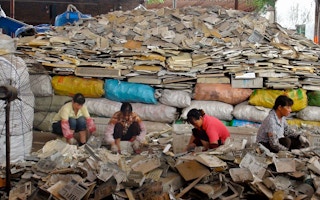Now that China has shut its borders to international recycling imports, it could be time for countries to take responsibility for their own trash, said experts at a recent waste management event in Singapore last week.
To continue reading, subscribe to Eco‑Business.
There's something for everyone. We offer a range of subscription plans.
- Access our stories and receive our Insights Weekly newsletter with the free EB Member plan.
- Unlock unlimited access to our content and archive with EB Circle.
- Publish your content with EB Premium.
Dr Chindarat Taylor, vice president of the Solid Waste Association of Thailand, said that as a result of China’s ban, it was a good idea for countries to consider their rubbish as an energy resource.
“There is a big drama at the moment about being unable to export plastic,” she said, referring to the global response to China’s waste restrictions.
Earlier this year, China notified the World Trade Organisation that it will no longer be accepting waste imports by the end of 2017. Under a scheme named National Sword, the world’s biggest reprocessor will slash the inflow of recycled waste due to the discovery of hazardous contaminants .
While using waste to produce energy is lower down on the energy recovery hierarchy than recycling, Taylor noted that the low price of oil is making waste-to-energy processing more viable.
She shared the example of how a factory that turned plastic waste to oil in Birmingham, England, had been mothballed after its owner found that his plant was unable to compete against cheap global oil prices.
Around 70 per cent of the world’s supply of unwanted plastics ended up in China last year, as did two-thirds of wastepaper and over 40 per cent of discarded plastics from the United States, to be recycled and used in the country’s vast manufacturing industries.
Fellow panellists at the WasteMET Asia Symposium meanwhile urged countries and cities to localise recycling and waste management processes.
“The best way [to avoid such issues] is to treat your own waste and not send it to your neighbour,” said Jeong Young Ae, senior officer at Seoul’s Sudokwon Landfill Management Corporation.
She shared with the audience how Fresh Kills Landfill on Staten Island—where New York had been sending its trash for decades—was shut down after complaints by residents. The city then had to divert its trash to neighbouring areas for treatment at a higher cost.
“Solve your own problem—not just because of social responsibility, but because you put yourself in a bad position where you have no leverage when your waste handler asks you to pay more,” she said.
Panel moderator Bettina Kamuk, chair of the Scientific and Technical Committee for The International Solid Waste Association, suggested that a carbon tax on plastic production could solve the problem of having to deal with waste in the first place.
On the other hand Jens Moller, consultant of the waste-to-energy division at Danish engineering firm Ramboll, said the welfare of society should be a top consideration. “If you have to treat your own trash, incineration might be cheaper, but you should also think about what’s best for society, what’s the right solution, and maybe accept that it costs more to treat plastic the right way.”
“Not everything should be reduced to a commercial decision,” he said.
Speaking to Eco-Business on the sidelines of the event, Dunwell Enviro-Tech Holdings’ business development director Victor Li said China’s move to clamp down on low quality recycling imports should not be surprising after the Operation Green Fence programme of 2014, where the country began to be more selective about what crossed its borders.
“It’s time for a paradigm shift. At all these conferences countries talk about how they need to recycle and be sustainable, but then complain to the World Trade Organisation after China decides not to accept their waste,” he said.
“What about recipient countries? They suffer environmental contamination as a result of processing others’ waste,” Li noted. He urged countries to clean up after themselves, and said this could be a chance to drive new momentum for innovation and more sustainable waste management. “The recycling ban is a good thing for China and the rest of the world.”
Jude Chow, chairperson of the Hong Kong Waste Management Association said the market for scrap materials was already seeing a short-term shock as a result of the ban.
But he added that it was a business opportunity for developing nations to step into the void left by China in the recycling market.
Regional prospects
But developing nations have their own waste issues to deal with. Talking about the difficulties in setting up waste-to-energy facilities in Malaysia and Indonesia, Ramboll’s Moller explained that sending garbage to landfills is so cheap that waste-to-energy plants cannot compete.
“You can tax landfills in Europe, but if you tax it in developing countries, people are just going to use dumping sites instead. You cannot control it in the same way.”
What would help is for a feed-in tariff to be imposed in order to give developers of waste management facilities certainty about their return on investment. “You need to control the waste, provide long-term contracts to developers, and also long-term power agreements. It seems logical, but it is the biggest obstacle,” Moller said.
Thailand-based Taylor said that the availability of supporting infrastructure was a barrier to more energy recovery processing projects in Southeast Asia. “A number of countries have grid capacity constraints, such as Myanmar and parts of Thailand, as well as inadequate transport infrastructure for the waste to be moved.”
But she was optimistic about the future of waste-to-energy in the region. “If you know what you want to do, understand the challenge and mitigate the risks, it’s an exciting market.”










